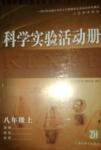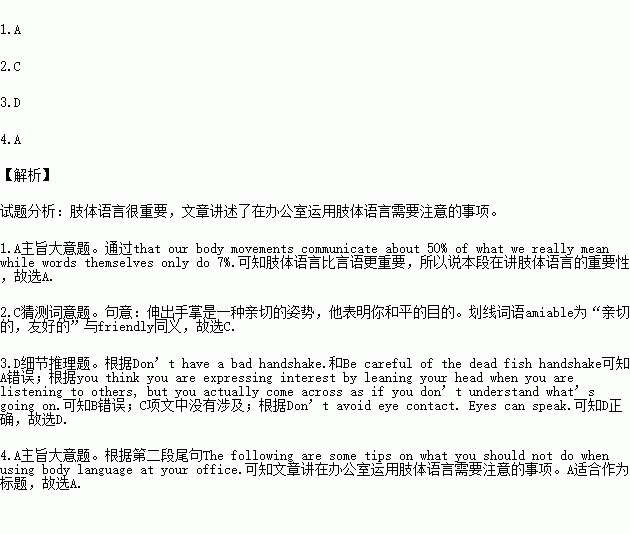题目内容
Body language is the quietest, most secret and most powerful language of all. It is said that our body movements communicate about 50% of what we really mean while words themselves only do 7%. So while your mouth is closed, just it is your body language that is saying.
When it comes to body language at the office, you may be making some big mistakes that could cause you trouble. The following are some tips on what you should not do when using body language at your office.
Don’t touch your co-workers, even if it’s on the back of the arm or shoulder. Many of your co-workers are not comfortable with any body contact(接触)with others. Be careful not to touch everyone at your office.
Don’t avoid eye contact. Eyes can speak. Lack of eye contact means cheat, and it can also point to no safety or lack of confidence. Trust and confidence are things you will communicate to the other person if you hold eye contact 50% of the time.
Don’t have a bad handshake. You’re going to show your kindness at once with a firm palm(手掌)to palm handshake. Showing the palms of your hands is an amiable gesture as it shows that you have a peaceful purpose. It means acceptance, and that you’re open to new ideas. Be careful of the dead fish handshake.
Don’t lean(倾斜) your head while listening to others. When listening to others, you should listen to him or her carefully with your head straight. For women especially, you think you are expressing interest by leaning your head when you are listening to others, but you actually come across as if you don’t understand what’s going on.
1.What can we learn from the first paragraph?
A. The importance of body language.
B. The development of body language.
C. The best way to communicate with others.
D. How to avoid making mistakes at the office.
2.The underlined word “amiable” in paragraph 5 can be replaced with______.
A. common B. polite C. friendly D. strange
3.It can be known from the passage that _____.
A. The stronger you shake hands with others the better.
B. Leaning your head when listening expresses interest.
C. Leaning back and forward shows you are thoughtful.
D. Eye contact is very important in communications.
4.Which of the following can be the best title for the passage?
A. Pay attention to your body language at the office.
B. How to get along with your co-workers.
C. The meaning of body language you should know.
D. Different countries have different body language.
 科学实验活动册系列答案
科学实验活动册系列答案
